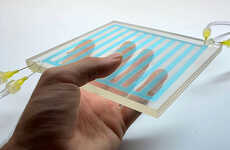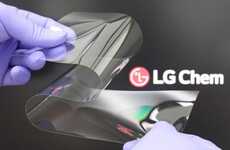
These Smart Windows' Transparency Can Be Altered In Seconds
Rahul Kalvapalle — March 23, 2016 — Tech
References: seas.harvard.edu & gizmag
A group of researchers and engineers working out of Harvard University are developing exceptionally high-tech smart windows that are capable of adjustable opacity, which allows you to control the amount of visibility and privacy offered by the windows.
While smart windows already do exist, they tend to make use of electrochemical reactions in order to be able to alter their transparency and opacity. While this is undeniably effective, it is very expensive and often requires the use of toxic materials. However the Harvard smart window uses a regular glass or plastic sheet that sits between two clear elastomer layers treated with silver nanowires, which can be activated to compress the elastomer layers and distort them, making the windows frosty in appearance.
Seeing as how they're based on physical rather than chemical technology, these smart windows could make tunable windows more affordable for both commercial and private applications.
While smart windows already do exist, they tend to make use of electrochemical reactions in order to be able to alter their transparency and opacity. While this is undeniably effective, it is very expensive and often requires the use of toxic materials. However the Harvard smart window uses a regular glass or plastic sheet that sits between two clear elastomer layers treated with silver nanowires, which can be activated to compress the elastomer layers and distort them, making the windows frosty in appearance.
Seeing as how they're based on physical rather than chemical technology, these smart windows could make tunable windows more affordable for both commercial and private applications.
Trend Themes
1. Adjustable Opacity - The development of smart windows with adjustable opacity presents an opportunity for innovative control over visibility and privacy.
2. Cost-effective Tunable Windows - The use of physical technology in smart windows could make tunable windows more affordable in various industries.
3. Eco-friendly Smart Materials - The use of non-toxic materials in smart windows offers an opportunity for environmentally friendly solutions in the industry.
Industry Implications
1. Architecture and Construction - The adjustable opacity feature of smart windows can revolutionize building design and privacy control in the industry.
2. Hospitality - Cost-effective tunable windows can enhance guest experience by providing customizable privacy levels in hotels and resorts.
3. Healthcare - The use of eco-friendly smart materials in windows can contribute to a healthier and sustainable environment in healthcare facilities.
4.8
Score
Popularity
Activity
Freshness























